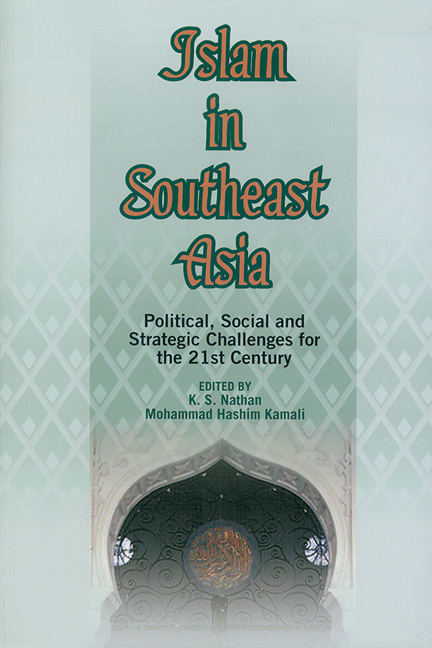Book contents
- Frontmatter
- Contents
- Preface
- Introduction: Understanding Political Islam Post-September 11
- PART ONE ISLAMIC DOCTRINE, HISTORY, GROWTH AND INSTITUTIONS IN SOUTHEAST ASIA
- 1 Islamic Thought: Theory, Concepts, and Doctrines in the Context of Southeast Asian Islam
- 2 The History of Islam in Southeast Asia: Some Questions and Debates
- 3 The Advent and Growth of Islam in the Philippines
- 4 Islamic Economic Institutions in Indonesia: A Religio-Political Perspective
- 5 The Development and Impact of Islamic Economic Institutions: The Malaysian Experience
- PART TWO POLITICS, GOVERNANCE, CIVIL SOCIETY AND GENDER ISSUES IN SOUTHEAST ASIAN ISLAM
- PART THREE MODERNIZATION, GLOBALIZATION AND THE ‘ISLAMIC STATE’ DEBATE IN SOUTHEAST ASIA
- PART FOUR IMPACT OF SEPTEMBER 11 ON ISLAMIC THOUGHT AND PRACTICE
- CONCLUSION: Addressing the Challenge of Political Islam in Southeast Asia
- Note on Contributors
- About the Editors
- Index
1 - Islamic Thought: Theory, Concepts, and Doctrines in the Context of Southeast Asian Islam
from PART ONE - ISLAMIC DOCTRINE, HISTORY, GROWTH AND INSTITUTIONS IN SOUTHEAST ASIA
Published online by Cambridge University Press: 03 November 2017
- Frontmatter
- Contents
- Preface
- Introduction: Understanding Political Islam Post-September 11
- PART ONE ISLAMIC DOCTRINE, HISTORY, GROWTH AND INSTITUTIONS IN SOUTHEAST ASIA
- 1 Islamic Thought: Theory, Concepts, and Doctrines in the Context of Southeast Asian Islam
- 2 The History of Islam in Southeast Asia: Some Questions and Debates
- 3 The Advent and Growth of Islam in the Philippines
- 4 Islamic Economic Institutions in Indonesia: A Religio-Political Perspective
- 5 The Development and Impact of Islamic Economic Institutions: The Malaysian Experience
- PART TWO POLITICS, GOVERNANCE, CIVIL SOCIETY AND GENDER ISSUES IN SOUTHEAST ASIAN ISLAM
- PART THREE MODERNIZATION, GLOBALIZATION AND THE ‘ISLAMIC STATE’ DEBATE IN SOUTHEAST ASIA
- PART FOUR IMPACT OF SEPTEMBER 11 ON ISLAMIC THOUGHT AND PRACTICE
- CONCLUSION: Addressing the Challenge of Political Islam in Southeast Asia
- Note on Contributors
- About the Editors
- Index
Summary
INTRODUCTION
There is little doubt that Islamic thought is very complex. The complexity of Islamic thought is even greater in philosophical, dogmatic, theoretical, and conceptual aspects especially if one puts it in the context of recent international developments such as the 11 September 2001 terrorist attack in the United States. The complexity is also great in the context of Southeast Asian Islam which, in addition to having a great deal of affinities with Middle Eastern Islam, possesses a number of distinctive characteristics due to its different historical, social, cultural and political realities.
There has been a lot of discussion whether Islam is one or many and, by extension, also if Islamic thought is monolithic or pluralistic. There are many among Muslims who maintain that Islam is only one; they refuse the perception that Islam is many. Responding to this matter, I would argue that at the level of the Qur'an — the original and primary source of Islam — Islam is one. There is no disagreement among Muslims that the Qur'an is God's revelation sent down to the Prophet Muhammad. But, Muslims from the time of post- Prophet Muhammad have been in disagreement about the Prophetic tradition (hadith, the second source of Islam), a portion of which is considered false and fabricated by Muslim religious scholars (ulama).
However, it is important to make it clear that the Qur'an and valid hadith need interpretation (ijtihad) from the ulama in order to formulate workable and implementable doctrines. The formulation of the ulama especially in the field of aqidah (beliefs) and fiqh (detailed interpretation of general principles of shari‘a contained in the Qur'an) are generally very detailed. Influenced by certain sociological, cultural, historical and political factors, differing if not conflicting interpretation of certain verses of the Qur'an and hadith among Muslim ulama have been existing not long after the death of the Prophet Muhammad. As a result, at the sociological level, there are many “Islams” or, to put it in a more precise way, there are many expressions of Islam throughout Islamic history.
SUNNISM AND SHI‘ISM
It is important to point out that much of the differences among Muslims had its origins not in the religious discourse, but in the political disputes and conflicts between the followers of Uthman ibn Affan, the third caliph, and of Ali ibn Abi Talib, the fourth caliph of the four rightly-guided caliphs (al-khulafa’ al-rashidun).
- Type
- Chapter
- Information
- Islam in Southeast AsiaPolitical, Social and Strategic Challenges for the 21st Century, pp. 3 - 21Publisher: ISEAS–Yusof Ishak InstitutePrint publication year: 2005



